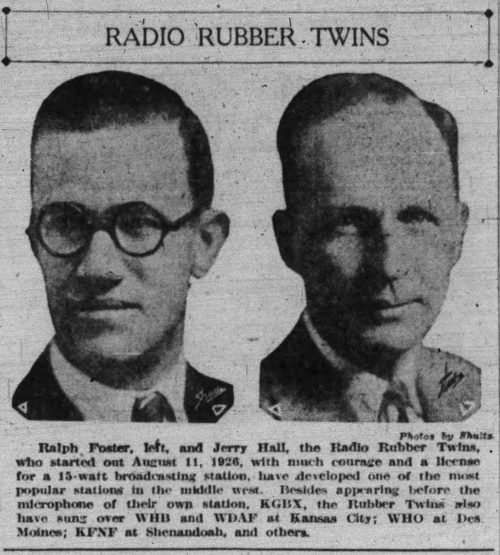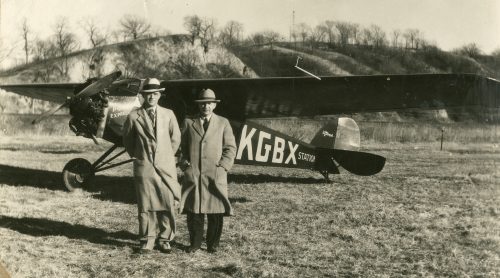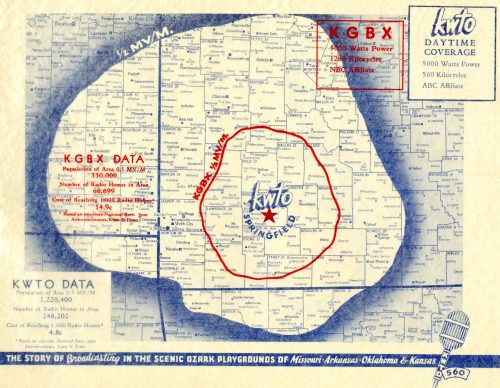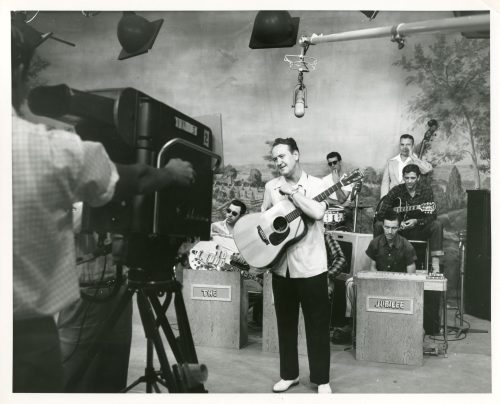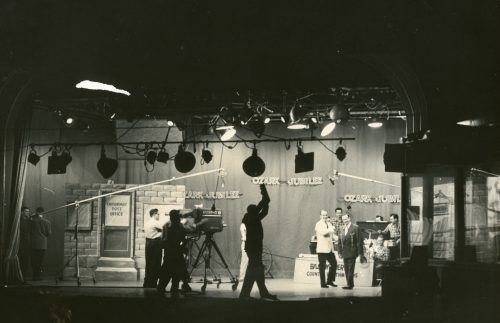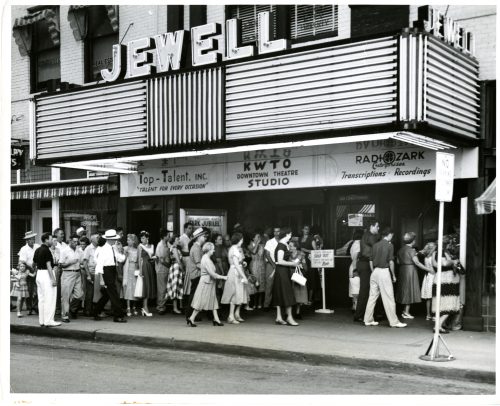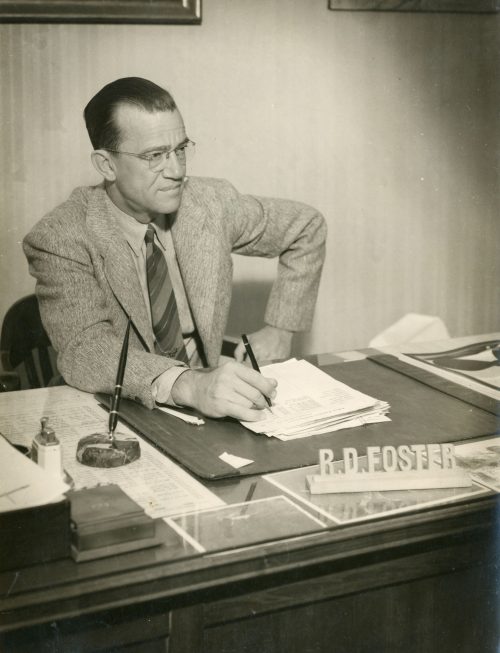![Ralph Foster Museum_019 Ralph Foster, no date. [Image courtesy of the Ralph Foster Museum]](https://historicmissourians.shsmo.org/wp-content/uploads/2024/08/Ralph-Foster-Museum_019-scaled-300x400.jpg)
Ralph Foster
Introduction
Ralph Foster was a radio and television pioneer from St. Joseph, Missouri. After operating a radio station in St. Joseph, he brought the industry to Springfield, eventually establishing KWTO radio station, RadiOzark Enterprises entertainment company, and the popular television show Ozark Jubilee.
Early Life
Ralph Donald Foster was born in St. Joseph on April 25, 1893, to Nancy Bryant and William T. Foster. His father was a well-known weatherman and journalist whose articles were published in several newspapers across the country. His weekly weather column “Foster’s Forecasts” appeared in the St. Joseph Herald. In 1902 the Foster family moved to Washington, DC, for his father’s work. Foster returned to St. Joseph in 1914 and worked as a salesman for the St. Joseph Railway, Light, Heat, and Power Company. He married Harriet Johnson in 1916.
"The Rubber Twins"
In 1919, Foster joined Jerry Hall in his Firestone Tire business. By 1924 the store would be called Foster-Hall Tire Company, located at 1221 Frederick Avenue in St. Joseph. Even before this partnership, the pair had entertained local crowds with musical duets, particularly of a song Hall wrote titled “In Dear Old St. Joe,” which was reportedly met with rousing applause and calls for repeated encores.
After appearing on WHB, a radio station in Kansas City, Foster and Hall set up a station of their own in 1926, operating out of a small studio inside their tire shop. Using an amateur radio station, the two men applied for and were issued a license to broadcast using the call letters KGBX. Their first broadcast aired on August 17, 1926, and featured local talent, with Foster and Hall as announcers. Foster and Hall also performed when they were not helping customers in the tire store. They became known on radio as “The Rubber Twins.”
KGBX
In 1929, the Foster-Hall Tire Company moved into a larger building at Nineteenth Street and Frederick Avenue with a dedicated studio space and soundproof walls for KGBX. The station established a local talent pool that featured “hillbilly” musicians and entertainers. The Rubber Twins also reported on local news, sports, weather, and farm reports.
In 1932, Jerry Hall sold his interest in the business to Foster’s brother-in-law, C. Arthur Johnson. The new partners sold the tire business and wanted to expand KGBX, but they did not see much room for the station to grow in St. Joseph. Businessman Lester E. Cox persuaded Foster and Johnson to move KGBX to Springfield, Missouri, where there was little to no competition on the airwaves. Cox appeared before the Federal Radio Commission in Washington, DC, to get permission for the move, and he also helped pay for their many projects. On September 9, 1932, KGBX started broadcasting out of the Chamber of Commerce building on East Walnut Street in Springfield.
KWTO
In the middle of the Great Depression in 1933, Foster, Johnson, and Cox purchased a second radio station with a larger reach than KGBX. The men changed its call letters to KWTO, which stood for their new slogan, “Keep Watching the Ozarks,” and started broadcasting on December 25, 1933.
KWTO shared staff and studio space with KGBX. In 1934, KGBX became an affiliate of the National Broadcasting Company (NBC) and broadcast the network’s national programs in addition to its own local content. KWTO featured local news, hillbilly music, and variety shows. Some of the earliest entertainers on both stations included Bill Ring, Slim Wilson, and the Goodwill Family. KWTO continually increased its ability to broadcast a more powerful signal that reached bigger audiences. By the late 1930s, KWTO’s signal reached north of the Missouri River, east to Rolla, northwest to Kansas City and into Kansas, and south into Arkansas. The station’s popularity rose as its signal range grew.
RadiOzark
With KWTO dominating the airwaves in southwest Missouri, Ralph Foster needed more performers to fill airtime and bring in advertisers. He founded RadiOzark Enterprises, Inc., in 1944 to book live performances throughout the Ozarks. Local organizations sponsored appearances of popular radio entertainers in schoolhouses, community buildings, and other public spaces. One of the first performances booked through RadiOzark was Jim West and the Gamble Twins at the Red Cross Pie Supper in Ruble, Missouri, in April 1944. In addition to talent booking, RadiOzark also created and sold books of songs, music, and square dance instruction.
RadiOzark became known for producing prerecorded radio shows, which they aired first over KWTO and then leased to other stations as syndicated programming. Called “transcriptions,” the phonograph records of the shows were mailed to stations across the country and Canada to broadcast over their signal area. The records had an average runtime of fifteen minutes per side, with blank sections that allowed advertisers to add commercials. One of RadiOzark’s first transcription records featured KWTO’s popular Haden Family and was produced in December of 1944.
Ozark Jubilee
In addition to RadiOzark Enterprises, Foster and business partners Si Siman and John Mahaffey created Top Talent, Inc. and Crossroads TV Productions to oversee their growing entertainment business. Top Talent, Inc. was formed in 1948 and oversaw finding new acts and booking air time for them. Crossroads TV Productions soon followed, serving as a television production agency for the newly created Ozark Jubilee. The Ozark Jubilee first aired locally on KYTV on December 26, 1953. The next year, Foster and his team acquired the lease to the Jewell Theatre and signed Red Foley as host. In July 1954 the Jubilee was awarded a contract by ABC-TV, and the show was set to air nationally on January 25, 1955.
Viewership grew quickly for Ozark Jubilee, with more than 12 million viewers during the show’s first year. Regular performers included Slim Wilson and the Tall Timber Trio, Porter Wagoner, and the Foggy River Boys. Many country music artists began their career on Ozark Jubilee, including Patsy Cline, Brenda Lee, and Johnny Cash. Ozark Jubilee averaged 2,000 visitors a week, with as many as thirty-four states represented on a single night. Half a block away from Route 66, the 1,200-seat Jewell Theatre drew standing-room-only crowds every Saturday. By 1956, Springfield had become the nation’s third-largest production center for live TV behind New York City and Hollywood. After nine years and almost 300 shows, the Ozark Jubilee’s last broadcast was on September 24, 1960.
Legacy
Foster’s passion for all things Ozarks led him to donate his vast collection of items to the College of the Ozarks’ museum in Point Lookout, Missouri. The museum collection reflects Foster’s love for hunting, fishing, and conservation, while other items represent his work in broadcasting, including a replica of Foster’s KWTO office. The College of the Ozarks voted to rename the Museum the “Ralph Foster Museum” in the mid-1960s due to Foster’s continued generosity.
In 1973, RadiOzark executives donated hundreds of transcribed radio programs to the Country Music Hall of Fame Library, and in 1974, Ralph Foster sold KWTO to Stuart Enterprises of Lincoln, Nebraska. Today, the station is owned by Zimmer Communications. Ralph Foster died on August 11, 1984, leaving behind a legacy as a pioneer of broadcasting in southwest Missouri. Foster was posthumously inducted into the Missouri Broadcasters Association Hall of Fame in 2017.
Text and research by Haley Frizzle-Green
References and Resources
For more information about Ralph Foster’s life and career, see the following resources:
Society Resources
The following is a selected list of books, articles, and manuscripts about Ralph Foster in the research centers of The State Historical Society of Missouri. The Society’s call numbers follow the citations in brackets.
Articles from the Newspaper Collection
- “Air Program Tonight.” St. Joseph News-Press. August 17, 1926. p. 1.
- “Jerry Hall, Foster Hit at Chautauqua.” St. Joseph Gazette. August 11, 1915. p. 6.
- “KGBX to Springfield.” St. Joseph News-Press. February 26, 1932. p. 1.
- “KWTO Stations Are Sold.” Springfield Leader and Press. July 23, 1975. p. 12.
- “Personalities of KWTO-KGBX: Ralph Foster.” Springfield Leader and Press. February 14, 1937. p. 17.
- “Radio Rubber Twins.” St. Joseph Gazette. November 20, 1927. p. 5B.
- “Radio Station Sold.” The King City Chronicle. July 7, 1933. p. 1.
- Stubblefield, Paul. “Radio Pioneer Tunes in Ozarks Museum.” Kansas City Star. July 21, 1975. p. 1.
- “This Quartet owes being to a Song.” St. Joseph Gazette. October 10, 1915. p. 6.
- Arnold, Eddy, et al. Ozark Jubilee: A Living Legacy. Missouri State University, 2003. [REF H268.71 Oz1 DVD]
- Blevins, Brooks. A History of the Ozarks, Volume 3: The Ozarkers. Urbana, Illinois: University of Illinois Press, 2021. [REF F417.O9 B64 2021]
- Hulston, John K. Lester E. Cox, 1895-1968: He Found Needs and Filled Them. Cassville, Missouri: Litho Printers, 1992. [REF F508.1 C8392]
- Spears-Stewart, Reta. Remembering the Ozark Jubilee. Springfield, Missouri: Stewart, Dillbeck & White Productions, 1993. [REF H268.71 Sp32]
- Hayden Family Booklets (R1095)
This collection contains promotional material related to the Hayden family musical group. - KWTO Newsletters (R0834)
This collection includes KWTO’s The Dial newsletters from 1944 to 1951. The newsletters contain information regarding staff, entertainers, and radio station updates. - Lester E. Cox Papers (C3596)
These papers consist of personal and professional records related to Springfield businessman Lester E. Cox, including his involvement with KWTO radio station and Ozark Jubilee. - Marion Tinsley Bennett Papers (C1043)
These papers contain personal and professional papers of Congressman Philip Bennett and his son and successor, Marion Bennett, from 1941 to 1948. The papers also include materials related to Missouri radio stations. - RadiOzark Record Collection (SP0071)
This collection contains 427 phonograph records that were produced and transcribed by RadiOzark Enterprises in Springfield, Missouri, between the 1940s to the 1960s.
Outside Resources
These links will take you outside the Society’s website. The Society is not responsible for the content of the following websites:
- Flower Pentecostal Family Heritage Center
This website is hosted by the Flower Pentecostal Heritage Center. This archive contains records related to KWTO’s involvement with the Assembly of God headquarters, as well as RadiOzark’s “Sermons in Song” radio program. - Missouri State University Special Collections & Archives
This website is hosted by Missouri State University. This institution houses several collections related to KWTO radio station and Ozark Jubilee. - Ralph Foster Museum
This website is hosted by the Ralph Foster Museum. This museum contains Ralph Foster’s personal collection, along with materials related to KGBX, KWTO, and Ozark Jubilee.


